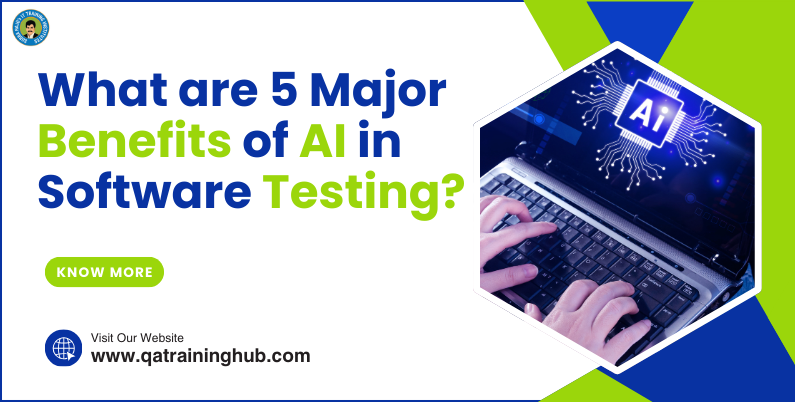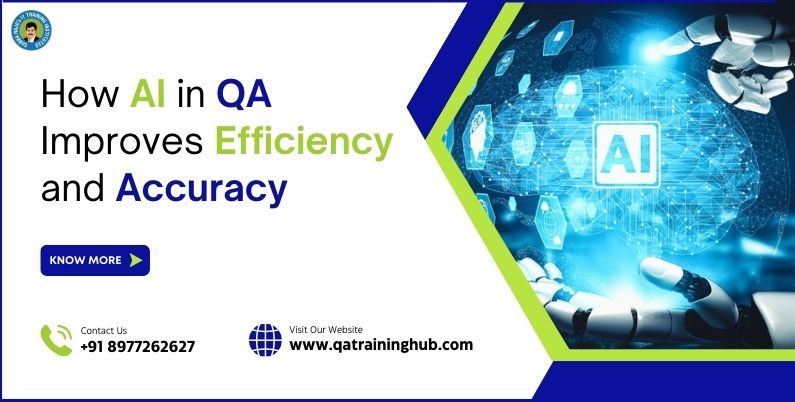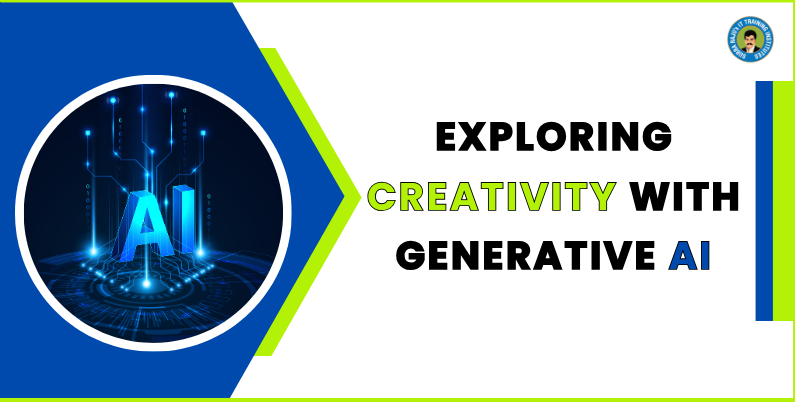What are 5 major benefits of using AI in Software Testing?

Using the Power of AI: 5 Major Benefits of AI in Software Testing
AI in software testing offers numerous benefits, In the software development, the demand for faster delivery, higher quality, and increased efficiency has never been greater. As companies aim to address these challenges, they are seeking out innovative approaches, and one increasingly popular option is the incorporation of Artificial Intelligence (AI) into software testing.By utilizing the capabilities of AI, businesses can streamline their testing processes, improve accuracy, and ultimately deliver better products to their customers. In this article, we’ll explore what are the 5 major benefits of using AI in software testing.
Increased Test Coverage: One of the primary challenges in software testing is achieving comprehensive test coverage.Manual testing, while dependable, is time-consuming and prone to human error. AI-powered testing tools can analyze vast amounts of data and identify patterns to generate comprehensive test scenarios, including edge cases and rare scenarios that might be overlooked in manual testing. This broader test coverage helps ensure that software is thoroughly evaluated and more strong against potential issues. With AI, organizations can ensure a higher degree of test coverage across different platforms, devices, and user interactions, leading to more strong and durable software products.
Faster Time-to-Market: Businesses are under constant pressure to deliver software updates and new features to market quickly to stay ahead of the competition. AI-driven automation accelerates the testing process by automating repetitive tasks such as test case generation, execution, and result analysis. This speedup in testing enables faster identification and resolution of defects, leading to shorter development cycles and quicker delivery of software products to market.Furthermore, AI algorithms can prioritize test cases based on risk factors, focusing testing efforts on areas of the application that are most likely to contain defects. This targeted approach allows teams to allocate resources more effectively and identify critical issues faster, thereby accelerating the overall time-to-market without compromising on quality.
Enhanced Accuracy and Reliability: Human error is an inherent risk in manual testing, leading to inconsistencies, oversights, and false positives/negatives. AI algorithms can execute tests with precision and consistency, minimizing human errors and ensuring consistent results. Machine learning algorithms can analyze code, logs, and test results to identify anomalies, trends, and correlations that might avoid human detection. Moreover, AI-powered testing tools can execute tests in a controlled, repeatable manner, minimizing variability .Additionally, AI-powered predictive analytics can identify potential defects early in the development process, reducing the likelihood of critical issues in production and improving software quality.
Optimized Resource Utilization: By automating repetitive testing tasks, AI helps optimize resource allocation, allowing testers to focus their efforts on more complex and high-value activities such as exploratory testing and test strategy planning. This efficient use of resources maximizes productivity and reduces the time and cost associated with software testing.Furthermore, AI-driven testing tools can scale effortlessly to accommodate growing testing needs without linear increases in costs. Whether testing a small-scale application or a large enterprise system, AI can adapt to the scope and complexity of the project, providing cost-effective testing solutions that deliver maximum value to organizations.
Continuous Improvement through Feedback: AI-driven testing tools can analyze testing data and performance metrics to provide valuable insights into the quality of the software and the effectiveness of testing strategies. This feedback loop enables continuous improvement by identifying areas for optimization and refining testing processes over time, leading to higher-quality software products and enhanced customer satisfaction.
Conclusion:
In conclusion, the integration of AI in software testing offers significant benefits, including increased test coverage, faster time-to-market, enhanced accuracy and reliability, optimized resource utilization, and continuous improvement through feedback. These advantages contribute to more efficient and effective testing practices, ultimately leading to the delivery of higher-quality software products. By utilizing the 5 major benefits of using AI in software testing, organizations can transform their testing processes, drive innovation, and deliver higher-quality software that meets the needs and expectations of today’s demanding customers.
At QA Training Hub, we recognize the transformative potential of AI in software testing and are committed to empowering individuals and organizations with the knowledge and skills needed to harness this technology effectively. With QA Training Hub as your partner, you can begin this journey with confidence, knowing that you have the support and expertise needed to succeed.
In a rapidly evolving industry where agility and creativity are essential, QA Training Hub remains committed to empowering professionals with the tools and expertise needed to succeed. Together, let’s harness the 5 major benefits of using AI in software testing to discover new possibilities and drive excellence in software testing.
FAQ’s
Q: What is AI in software testing?
A: AI, or Artificial Intelligence, refers to the use of machine learning algorithms and advanced analytics techniques to automate and optimize various aspects of software testing processes.
Q: How does AI enhance test coverage?
A: AI-powered testing tools automate test case generation and execution, enabling testers to achieve comprehensive coverage across various scenarios, configurations, and platforms.
Q: What advantages does AI offer in terms of accuracy and reliability?
A: AI technologies excel in processing vast amounts of data with precision, leading to improved accuracy and reliability in software testing by reducing human error and ensuring consistent results.
Q: Can AI accelerate time-to-market without compromising quality?
A: Yes, AI accelerates time-to-market by automating repetitive testing tasks, prioritizing test cases based on risk factors, and providing deeper insights into application quality and performance. By streamlining testing processes and identifying critical issues faster, AI enables faster releases without compromising quality.







